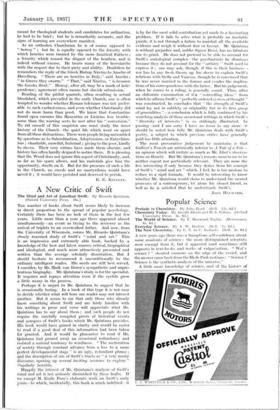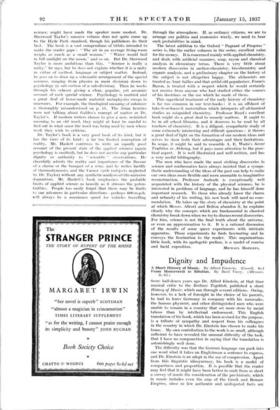Popular Science
Prelude to Chemistry. By John Read. (Bell. 12s. 64.1.) Chemistry Today. By Arnold Allcott and H. S. Bolton. (Oxford University Press. 3s. 6d.) The World of Science. By F. .Sherwood Taylor. (Heinemann. 8s. 6d.) Everyday Science. By A. W. Haslett. (Bell. 7s. 6d.).
The New Chemistry. By E. N. da C. Andrade. (Bell. 3s. 13d.)
A FEW years ago there was a bumptious self-confidence about some amateurs of science : the more distinguished scientists were exempt from it, but it appeared (and sometimes still appears) in text-books and works of vulgarisation. " Wot's
science ? " shouted someone on the edge of the crowd, and the answer caine back from the Hyde Park rostrum : " Science? Science is the synthetic analysis of the universe."
A little more knowledge of science, and of the history of science, might have made the speaker more modest. Dr.
Sherwood Taylor's massive volume does not quite come up to the Hyde Park standard, though his publishers do their
best. The book is a vast compendium of titbits intended to make the reader gape : " The air in an average living-room weighs as much as a small woman." " Water would boil in full sunlight on the moon," and so on. But Dr. Sherwood Taylor is more ambitious than this. " Science is really a unity," he says, but he does not explain whether it is a unity in virtue of method, language or subject matter. Instead, he goes on to draw up a schematic arrangement of the special sciences, ranging from physics (a main division) down to psychology (a sub-section of a sub-division). Then he works through his scheme giving a clear, popular, yet accurate account of each special science. Psychology is omitted and a great deal of home-made material metaphysics creeps in unawares. For example, the theological meaning of substance is thoroughly misunderstood on p. 11. The Arian heretics were not talking about Galileo's concept of matter or Dr. Taylor's. If modern writers choose to give a new, restricted meaning to an old word, they might at least be careful to find out in what sense the word was being used by men whose work they wish to criticise.
Dr. Taylor's book is a very good book of its kind, but it has the vices of its kind : a far too limited conception of reality. Mr. Haslett contrives to write an equally good account of the present state of the applied sciences (again psychology is omitted), but he does not ascribe any particular dignity or authority to " scientific " observations. He cheerfully admits the reality and importance of the flavour of a cheese or the bouquet of a wine, and he writes lucidly of thermodynamics and the Carnot cycle (subjects neglected by Dr. Taylor) without any synthetic-analysis-of-the-universe dogmatism. Mr. Haslett's book emphasises the probable limits of applied science as heavily as it stresses the poten- tialities. People too easily forget that there may be limits to our advances in particular directions—perhaps 600 m.p.h. will always be a maximum speed for vehicles travelling
through the atmosphere. If, as ordinary citizens, we are to arrange our politics and economics wisely, we need to bear such probabilities in,laiind.
The latest addition to the Oxford Pageant of Progress " series is, like the earlier volumes in the series, excellent value for the money. It is concerned mainly with applied chemistry. and deals with artificial manures, soap, rayon and chemical analysis in elementary terms. There is very little about modern discoveries in surface-chemistry, bio-ehemistry and organic analysis, and a preliminary chapter on the history of the subject is not altogether happy. The alchemists arc treated as Aunt Sallies and that artful old populariser, Franck, Bacon, is treated with a respect which he would certainly not receive from anyone who had studied either the sources of his doctrines or the use which he made of them.
This superficial treatment of the early history of chemistry is far too common in our text-books : it is an offshoot of take-it-or-leave-it materialism which interprets all alchemical studies as misguided chemistry. Professor Read's excellent book might do a great deal to remedy matters. It ought to be in all school libraries, and it deserves to be read by all teachers of chemistry. It .is a diligent, sympathetic study of some extremely interesting and difficult questions : it throws a great deal of light on the formation of our modern ideas and serves to show both their advantages and their limitations. In scope, it might be said to resemble A. E. Waite's Secret Tradition in Alchemy, but it pays more attention to the prac- tical aspect. It is well illustrated and well written, and has a very useful bibliography.
The men who have made the most striking discoveries in science and mathematics have always insisted that a sympa- thetic understanding of the ideas of the past can help to make our own ideas more flexible and more amenable to imaginative reconstruction. Professor Andrade is exceptionally well acquainted with the history of the physical sciences, he is interested in problems of language, and he has himself done important research. To those who already know the charm and urbanity of his writing, his new book will need no com- mendation. He takes up the story of chemistry at the point at which Messrs. Allcott and Bolton abandon it, he explains clearly why the concepts which are fundamental in classical chemistry break down when we try to discuss recent discoveries. For him, science is not the final truth about the universe, or even an approximation to it. It is a rational discussion of the results of some queer experiments with intricate apparatus. Those experiments he finds fascinating and he conveys the fascination to the reader. This unpretentious little book, with its apologetic preface, is a model of concise
avalCHAEL ROBERTS.











































 Previous page
Previous page